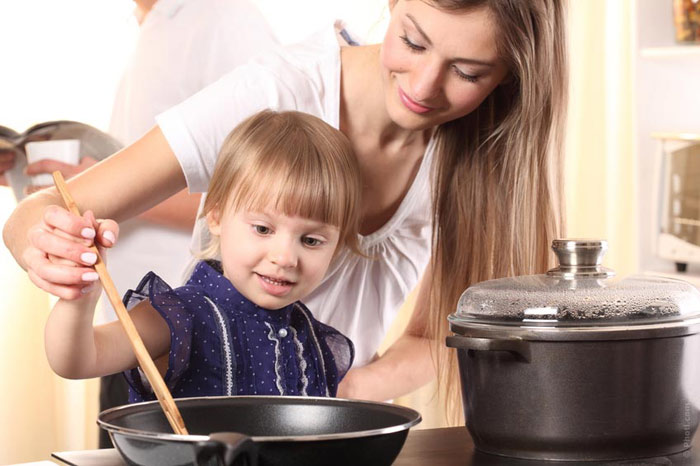5 Grandma’s Tips on Raising Kids
Sometimes the tips on raising kids that grandmothers give to young mothers are very meaningful. Which of them should you follow?

The views on how to raise children are changing so rapidly that modern moms consider the tips given by their children’s grandmothers to be outdated, and these tips often cause nothing but irritation. However, such approach proves to be wrong. As it turns out, grandmothers are right in certain cases. Geniusbeauty.com makes a selection of grandmothers’ advice and comments which are worth considering, as shown by the latest research.
Give the kid something to eat from your plate
In the good old days, mothers did not spend time preparing some special foods for kids – they just gave them what the whole family ate. In fact, this is nothing but the popular nowadays feeding up, the essence of which is to allow the kid to try any food on your plate that he/she likes. This confirms the truth once again: everything new is well forgotten old.
Why don’t you like the usual soap?
Earlier, special antibacterial agents could be found only in hospitals, but now it is impossible to take a child for a walk without microbe-killing wipes or a hand gel. Have you spent some time on the swing? Let’s wipe the hands. Have you stroked the dog? Wipe the hands twice as carefully. Have you picked up a pebble? Wipe the hands again – and you are running out of the pack of wipes.
This crackdown on microbes only leads to the appearance of new microorganisms that are resistant to all existing antibiotics. According to specialists, it is much more effective and safer to just wash your hands with plain soap.
We used to bathe the baby only once a week
When our grandmothers were girls, it was considered quite normal and sufficient to wash the baby once a week. Nowadays, no self-respecting mother would send the kid to bed, without bathing him/her first and soaping the baby well from head to toe.
However, the researchers concluded that thorough daily cleaning facilitates the removal of natural secretions from the skin that provide lubrication, moisturize, and protect against microbes. As a result, atopic dermatitis and other skin lesions have nowadays become common diseases in children.
Before going to bed, it is necessary to wash the kid’s face, wash the genitals and the feet, and the “bath day” can be arranged once a week. What a relief, isn’t it?
What nonsense it is to add salt; just boil chicken soup!
Current recommendations for child nutrition categorically require not to consume salt baby food. But, as suggested by a pediatrician and author of the book “Even if your child eats this book, nothing will happen,” Lara Zibners, such a ban gives parents the wrong instructions. The child necessarily needs salt, though to a lesser extent than adults. Salt deficiency in the body may lead to convulsions and even death. By the time you introduce solid foods, the baby’s kidneys have developed enough to properly regulate the salt balance in the body. Sibners believes that if you salt the kid’s food a little, nothing terrible will happen.
According to Zibners, the good old grandmother’s chicken soup will bring your kid nothing but benefit.
Quickly take the poor little one in your hands!
Many modern “educational gurus” advise against rocking babies in your arms, and for letting them cry and sleep in their beds. This supposedly teaches them to fall asleep by themselves and enables parents to sleep. Grandmothers, as a rule, are not able to quietly watch such radical methods of training infants (not only grandmothers, it should be admitted).
And the results of the study conducted by the researchers at the University of North Texas confirmed the right of grandparents to interfere. As it turned out, when the kids have learned to fall asleep by themselves, the level of the stress hormone cortisol in their blood is still very high, which leads to serious health consequences, especially for the nervous system and psyche.
Experts believe that babies just learn to suppress their emotions because their cry for help does not lead to a response from the parents. As a result, the victims of this extreme fall-asleep training face the increased risk of mental disorders at a later age.
